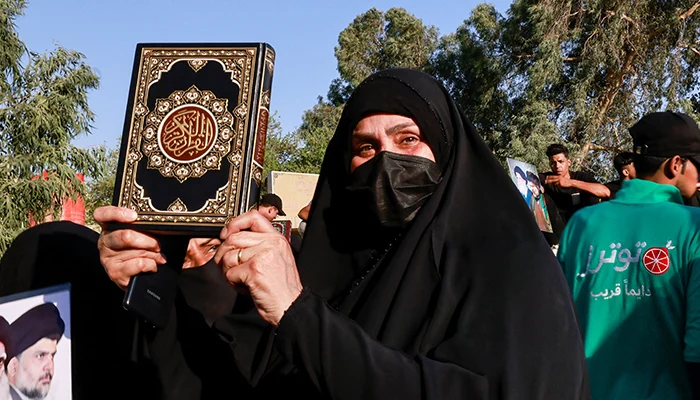Sana Zara
Distinguishing between the freedom of speech and deliberate actions intended to insult and offend should not be an insurmountable task. It is crucial, especially for the Western world, to recognize that the desecration of the Holy Quran falls squarely into the latter category.
The recent abhorrent incident, in which an Iraqi refugee set fire to a copy of the Holy Book outside a mosque in the Swedish capital, is not an isolated event. Regrettably, it is unlikely to be the last occurrence unless Western nations move beyond mere condemnations and enact and enforce stringent laws that deter those who perpetuate a hate-filled narrative against the 1.8 billion Muslims worldwide, taking advantage of government inaction.
A similar act of desecration took place in Stockholm earlier this year when a far-right politician defiled the Quran in front of the Turkish embassy. To the dismay of many, the punishment meted out for this offensive act was a mere slap on the wrist, with the Swedish prime minister dismissing it as “deeply disrespectful.” Prior to this statement, he made the disconcerting remark, “But what is legal is not necessarily appropriate.”
Perhaps it is time to question the very “legality” of such heinous actions, not only in Sweden but in other countries as well. Following the recent incident, condemnation has poured in from all corners. The European Union has labeled it an act of provocation and declared that “manifestations of racism, xenophobia, and related intolerance have no place in Europe.” Sadly, the reality on the ground has shown otherwise, with numerous anti-Islam incidents occurring across various European nations.
Don’t forget to Subscribe our channel & Press Bell Icon.
It is high time for governments to move beyond hollow rhetoric and take concrete steps to address this rising tide of Islamophobia. Strict legislation must be enacted to deter those who seek to sow hatred and division. This goes beyond superficial condemnations and requires a genuine commitment to protecting the rights and dignity of all individuals, regardless of their religious beliefs.
The need for robust laws is not an infringement on freedom of speech; rather, it is a necessary safeguard against the incitement of hatred and the erosion of social harmony. The protection of religious sentiments is a fundamental aspect of a civilized society that values diversity and respects the beliefs of others.
Furthermore, it is incumbent upon the Western world to engage in introspection and examine the systemic factors that contribute to the perpetuation of Islamophobic attitudes. Education, dialogue, and interfaith initiatives can play a crucial role in fostering understanding, empathy, and mutual respect among different communities.
Sweden has expressed similar disapproval of the recent incident, but also emphasized the country’s “constitutionally protected right to freedom of assembly, expression, and demonstration.”
The Pope took a more direct stance, stating, “Freedom of speech should never be wielded as a tool to belittle others, and allowing such behavior is rejected and condemned.” In response, the 57-member Organization of Islamic Cooperation (OIC) has called for the enforcement of international law, which explicitly prohibits the promotion of religious hatred.
The scars left by Hitler and World War II, with its six million Jewish victims, remain etched in Europe’s collective memory. The images and narratives from that era continue to haunt not only those who experienced it firsthand but also subsequent generations. Recognizing the significance of this dark chapter, the United Nations designated January 27 as International Holocaust Remembrance Day in 2005.
Many European nations have enacted legislation that criminalizes Holocaust denial. It is a stark reminder that the world is once again teetering on the precipice of hatred, directed towards ethnic and religious communities, minorities, and those perceived as the “other.”
The venomous rhetoric aimed at the Muslim world was a driving force behind the UN’s decision to designate March 15 as the International Day to Combat Islamophobia. Just as Europe and other countries stand against anti-Semitism, they must utilize all available means, including legal measures, to halt the rise of Islamophobia before it reaches irreparable levels.
The fight against Islamophobia requires a collective effort, transcending borders and ideologies. It demands that societies come together to challenge prejudice, discrimination, and the demonization of Islam and its followers. By promoting understanding, embracing diversity, and fostering dialogue, we can build bridges of tolerance and acceptance.
Governments must take a proactive stance in combating Islamophobia, implementing comprehensive strategies that encompass education, legislation, and community engagement. It is crucial to dismantle the systemic barriers that perpetuate intolerance and to foster an environment of inclusivity and respect for all faiths.
While the right to freedom of speech is a cornerstone of democratic societies, it should never be weaponized to propagate hatred and disdain. We must strike a delicate balance between freedom of expression and the responsibility to ensure that such expressions do not incite violence or promote discrimination.
In conclusion, the fight against Islamophobia necessitates unwavering commitment from the international community. It requires us to challenge the rising tide of hatred and bigotry, just as we have confronted the horrors of the Holocaust. By upholding the values of tolerance, compassion, and mutual respect, we can create a world that embraces diversity and celebrates the richness of different cultures and religions. Together, we can dismantle the walls of prejudice and build a future where every individual is treated with dignity and equality.
Subscribe our website for latest updates:
https://republicpolicy.com/shop/
Read More
















